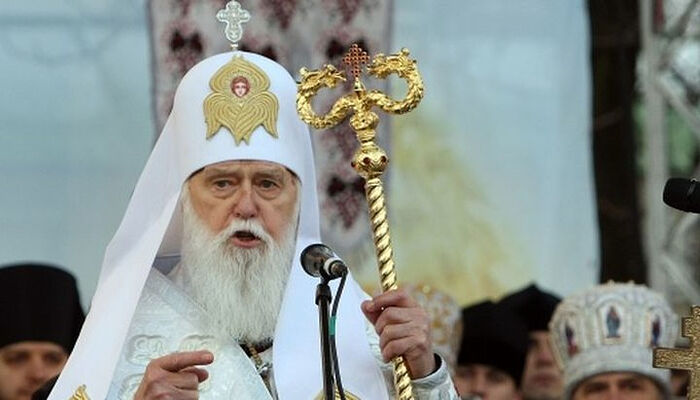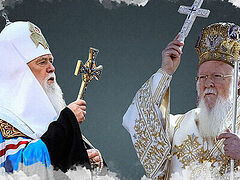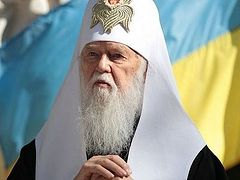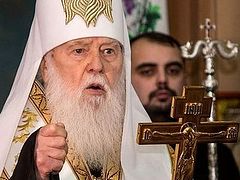Kiev, December 18, 2020
According to “Metropolitan” Mikhail Zinkevich of Volyn, more and more “hierarchs” of the “Orthodox Church of Ukraine” (OCU) are beginning to sympathize with “Honorary Patriarch” Philaret Denisenko, who left the OCU to revive his “Kiev Patriarchate” (KP) in the summer of 2019, citing the insufficiency of the tomos of autocephaly given by Constantinople.
And the OCU continues to lose clergy to Philaret, who happily turns them into bishops for his KP.
Yesterday, Philaret and others consecrated their 12th “hierarch,” Mikhail Kovalyuk of Kherson. Kovalyuk was elected to the episcopate on December 12, when a council of the KP also created the diocese that he now leads.
In December 2018, the KP initially united with the “Ukrainian Autocephalous Orthodox Church to form the OCU (though Philaret quickly became disillusioned with the Constantinople-Poroshenko project), thus the hierarchs of the KP, including Kovalyuk, are former members of the OCU.
Just the day before his consecration in the KP, Kovalyuk was suspended from serving and expelled from the clergy of the Kherson Diocese of the OCU, for “anti-church and schismatic activities.” “Hieromonk” Theodosy Chernyatisnky was also suspended by the same decree, reports Pravblog, which published the relevant ukaz from the Kherson Diocese of the OCU.
It is not known how many parishioners Kovalyuk will have in his newly-established diocese, but as Pravblog comments, with its ukaz of suspension, the OCU implicitly acknowledges that it has a schism on its hand, albeit a small one for now.
However, if “Metropolitan” Mikhail Zinkevich is correct, we could expect to see the schism grow and more people join Philaret in his KP. Zinkevich is one of the most authoritative and well-connected hierarchs of the OCU. At the “unification council” in December 2018, he was the popular candidate to lead the new OCU, though he withdrew his candidacy due to the political maneuverings of Philaret.
The “Patriarch” ensured that his protégé Epiphany Dumenko was elected, assuming he would be the real power behind the throne. However, disillusioned with the comparatively insignificant role he ended up having in the OCU, and disillusioned with the semi-independence granted by Constantinople’s tomos of autocephaly, after half a year in the OCU, Philaret showed himself the door and revived his KP, which now numbers 12 bishops and several dioceses.
In a recent interview with the Ukrainian outlet Glavcom, Zinkevich noted that sympathy for Philaret is growing amongst the hierarchs of the OCU. He had led the schismatic autocephalous movement for 30 years before being denied the right to even try for the primacy in the OCU and being relegated to the role of a mere diocesan bishop. Moreover, as Zinkevich emphasizes, the issues that Philaret raises and the questions he asked are both wholly legitimate and left unanswered by the OCU leadership.
They are like ostriches with their heads in the sand, not even attempting to respond to Philaret’s accusations, he comments.
As Zinkevich explains, leading up to the “unification council” in December 2018, all those involved were so excited and so focused on simply uniting, that the question of the contents of the tomos of autocephaly never really even entered anybody’s minds.
Then the tomos was given in Istanbul on January 6, and when its contents became known, not everyone was happy, Zinkevich explains, least of all Philaret. OrthoChristian has reported several times before about how the OCU’s tomos of autocephaly actually grants it less independence than the canonical Ukrainian Orthodox Church enjoys as an autonomous Church within the Moscow Patriarchate.
The most serious issues that Zinkevich notes are the fact that the OCU is not allowed to make its own Chrism, which is usually understood as a sign of independence, although Constantinople does force several Churches to get their Chrism only from it.
The “Kiev Patriarchate” was independent and always made its own Chrism, Zinkevich notes. Why should it lose independence and have to turn to Constantinople now?
An especially painful point, he emphasizes, is that the tomos forbids the OCU from having parishes outside of Ukraine. But the people in those parishes are their Ukrainian compatriots and relatives, the OCU hierarch notes. Why should they be separated?
All of these questions that Philaret emphasizes are very serious, but no one, not even “Metropolitan” Epiphany Dumenko is trying to answer them. Everyone is just silent, waiting to be told what to do, Zinkevich emphasizes.
Thus, while no one knows what the future holds, there is the possibility that such growing sentiments within the OCU will lead to a schism on a larger-scale than has already occurred, or to the overthrow of Epiphany Dumenko, who is known as a weak leader who only has his position thanks to Philaret Denisenko anyways.
In February of this year, the OCU Synod finally removed Philaret as a member, though it still naively considers him a member of the OCU. He was “retired” and forbidden to celebrate ordinations and consecrations. However, as Epiphany explained, Philaret was allowed to remain a bishop of the OCU because defrocking him would be too Russian. He was once the canonical Metropolitan of Kiev in the Russian Church, but was suspended, defrocked, and anathematized for persisting in schism.
Thus, by basing its identity on being not Russian, the OCU has backed itself into a corner, unable to keep good order within its own structure.
And Pat. Bartholomew and the Patriarchate of Constantinople are likewise unable to deal with the Philaret matter without losing face. It was Constantinople that decided to unilaterally lift the 25-year-old anathema placed upon Philaret by the Russian Orthodox Church. His anathema was illegitimate—a punishment for desiring Ukrainian autocephaly, Constantinople assured the Orthodox world.
Thus, Constantinople blessed his years of schismatic activity outside the Church as a legitimate path for an Orthodox bishop to take. And it was in schism that Philaret consecrated the majority of the bishops who now make up the OCU. And as he has not been suspended, the consecrations he continues to celebrate must also be legitimate in the eyes of Constantinople and the OCU, albeit done in defiance of the OCU Synod.
Were Constantinople to place canonical sanctions against Philaret again, it would be an acknowledgement that the Russian Church was right about him all along. Instead, they are forced to simply let a rogue bishop continue to do as he pleases, and many in the OCU are re-warming up to their former leader.
Follow us on Facebook, Twitter, Vkontakte, Telegram, WhatsApp, Parler, MeWe, and Gab!





